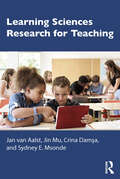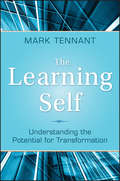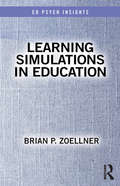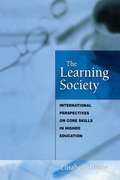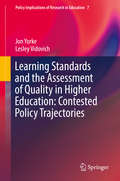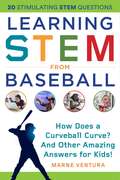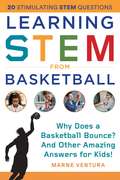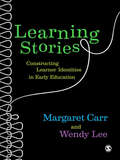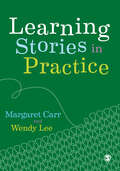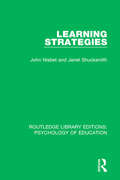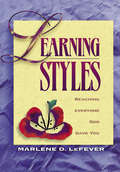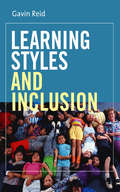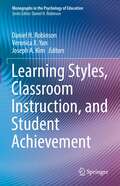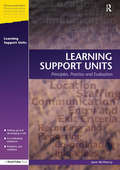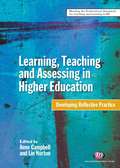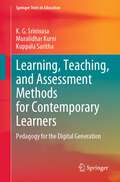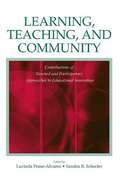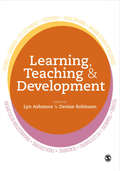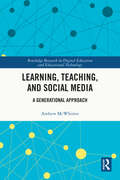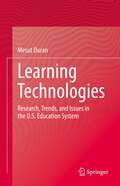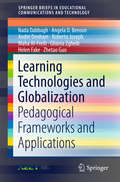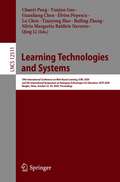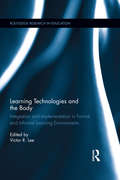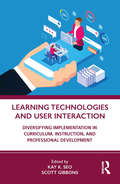- Table View
- List View
Learning Sciences Research for Teaching
by Jan van Aalst Jin Mu Crina Damşa Sydney E. MsondeLearning Sciences Research for Teaching provides educators with a fresh understanding of the use and implications of learning sciences scholarship on their studies and professional preparation. A highly interdisciplinary field, the learning sciences has been expressly focused on the advancement of teaching and learning in today’s schools. This introductory yet cutting-edge resource supports graduate students of teaching, leadership, curriculum, and learning design in research methodology courses as they engage with and evaluate research claims; integrate common methods; and understand experimental, case-based, ethnographic, and design-based research studies. Spanning the learning science’s state-of-the-art approaches, achievements, and developments, the book includes robust, accessible coverage of topics such as professional development, quantitative and qualitative data, learning analytics, validity and integrity, and more.
The Learning Self
by Mark TennantThis new book from the award-winning author of Psychology and Adult Learning puts the spotlight on the kind of learning that brings about significant personal change. Tennant explores the techniques, processes, and practices educators can use to promote learning that leads to change and examines assumptions about self and identity, how we are formed, and our capacity for change. Throughout the book, Tennant posits that individuals can be agents in their own self-formation and change by understanding and acting on the circumstances and forces that surround and shape them. Educators, he argues, must be open to different theoretical ideas and practices while simultaneously valuing these practices and viewing them with a critical eye. The book aims to: promote, among educators and others with an educational dimension to their work, a more critical approach to their learning designs and practices; equip individuals with a framework for understanding and being agents of their own self-formation and change.
Learning Simulations in Education (Ed Psych Insights)
by Brian P. ZoellnerTechnology-enabled simulations are increasingly used for students in K-12 education and have the potential to improve teaching and learning across domains. Across five chapters, this book explores the psychological foundation of simulation use in instruction, guiding readers through individual differences among learners and contexts while addressing theory, pedagogy, cognitive processes, and more. This concise volume is designed for any education course that includes simulations in the curriculum and will be indispensable for student researchers and both pre- and in-service teachers alike.
The Learning Society: International Perspectives on Core Skills in Higher Education
by Elisabeth DunneThis text provides perspectives in British and international interpretations of a learning society and what the roles of core skills are. The book covers what should be happening in theory and what is happening in practice and develops a critical awareness of the issues.
Learning Standards and the Assessment of Quality in Higher Education: Contested Policy Trajectories
by Jon Yorke Lesley VidovichThis book analyses accountability and quality policies relating to learning standards and examines their implications for assessment in higher education. Whilst primarily focusing on the Australian setting, this analysis is located within a broader frame of reference that includes the United Kingdom (UK), the United States of America (US), and the Organisation for Economic Cooperation and Development (OECD). Across these settings, comparative measures of learning have been seen as a policy 'solution' to the problem of 'proving quality' in a globalised and increasingly competitive higher education market. Comparative measures of learning depend on the specification of learning standards. Learning standards attempt to articulate the capabilities expected of graduates, and students' achievement of these is determined through the practices of assessment carried out within institutions. Quality policy, learning standards and assessment practices all intersect within the broader umbrella of accountability, with relevance to governments, higher education providers, employers, parents, and students. The findings reported in this book highlight a number of policy influences, including the rising demands for national and international comparative data on learning standards to compare quality and inform student choice in a globally competitive market.
Learning STEM from Baseball: How Does a Curveball Curve? And Other Amazing Answers for Kids! (STEM Sports)
by Marne VenturaGet your sports-loving kid excited about Science, Technology, Engineering, and Math By integrating the thrill of learning into the context of baseball, Learning STEM from Baseball presents a whole new ball game. Unleash the inner scientist, engineer, and mathematician in your child as they learn that sports and STEM aren't so separate after all. You'll both love finding out the answers to questions such as: What's a sweet spot?When was the pitching machine invented?How are baseballs made?How do numbers help baseball players? What are some STEM careers in baseball?And so much more! This easy-to-follow introduction to STEM topics sets kids up to make connections across subjects, discover new facts about baseball, and grow curious about academic fields!
Learning STEM from Basketball: Why Does a Basketball Bounce? And Other Amazing Answers for Kids! (STEM Sports)
by Marne VenturaGet your sports-loving kid excited about Science, Technology, Engineering, and Math By integrating the thrill of learning into the context of basketball, Learning STEM from Basketball presents an educational slam dunk. Unleash the inner scientist, engineer, and mathematician in your child as they learn that sports and STEM aren't so separate after all. You'll both love finding out the answers to questions such as: Why does a basketball bounce?What's a shot clock?Why does a basketball rim have a net?What's the math behind a free throw?And so much more! This easy-to-follow introduction to STEM topics sets kids up to make connections across subjects, discover new facts about basketball, and grow curious about academic fields!
Learning Stories: Constructing Learner Identities in Early Education
by Dr Margaret Carr Ms Wendy LeeShortlisted for the 2013 Nursery World Awards! Margaret Carr's seminal work on Learning Stories was first published by SAGE in 2001, and this widely acclaimed approach to assessment has since gained a huge international following. In this new full-colour book, the authors outline the philosophy behind Learning Stories and refer to the latest findings from the research projects they have led with teachers on learning dispositions and learning power, to argue that Learning Stories can construct learner identities in early childhood settings and schools. By making the connection between sociocultural approaches to pedagogy and assessment, and narrative inquiry, this book contextualizes Learning Stories as a philosophical approach to education, learning and pedagogy. Chapters explore how Learning Stories: - help make connections with families - support the inclusion of children and family voices - tell us stories about babies - allow children to dictate their own stories - can be used to revisit children's learning journeys - can contribute to teaching and learning wisdom This ground-breaking book expands on the concept of Learning Stories and includes examples from practice in both New Zealand and the UK. It outlines the philosophy behind this pedagogical tool for documenting how learning identities are constructed and shows, through research evidence, why the early years is such a critical time in the formation of learning dispositions. Margaret Carr is a Professor of Education at the University of Waikato, New Zealand. Wendy Lee is Director of the Educational Leadership Project, New Zealand.
Learning Stories in Practice
by Ms Wendy Lee Margaret CarrMargaret Carr and Wendy Lee have often been asked for a follow-on practical companion to their seminal 2012 book Learning Stories; a complimentary book that provides practical advice for teachers who are embarking on a ‘narrative assessments-for-learning’ journey. After much anticipation that book is here at last! Packed with a wide range of full-colour examples of real life learning stories from all over the world this practical guide is influenced by their ongoing work with teachers across many countries and the thoughtful comments and questions that teachers have asked during conversations at conferences, lectures and professional development programmes. They have turned these conversations with teachers and students into key ideas, and a practical framework on how to initiate and create good learning stories and why they are valuable. They show you how to write stories that capture the magic and excitement of each young child's journey through the early years and how to develop a deep professional understanding of the learning that takes place during this special and influential time in their lives.
Learning Stories in Practice
by Ms Wendy Lee Margaret CarrMargaret Carr and Wendy Lee have often been asked for a follow-on practical companion to their seminal 2012 book Learning Stories; a complimentary book that provides practical advice for teachers who are embarking on a ‘narrative assessments-for-learning’ journey. After much anticipation that book is here at last! Packed with a wide range of full-colour examples of real life learning stories from all over the world this practical guide is influenced by their ongoing work with teachers across many countries and the thoughtful comments and questions that teachers have asked during conversations at conferences, lectures and professional development programmes. They have turned these conversations with teachers and students into key ideas, and a practical framework on how to initiate and create good learning stories and why they are valuable. They show you how to write stories that capture the magic and excitement of each young child's journey through the early years and how to develop a deep professional understanding of the learning that takes place during this special and influential time in their lives.
Learning Strategies (Routledge Library Editions: Psychology of Education)
by John Nisbet Janet ShucksmithOriginally published in 1986, designed for teachers and those concerned with the education of primary and secondary school pupils, Learning Strategies presented a new approach to ‘learning to learn’. Its aim was to encourage teachers to start thinking about different approaches to harnessing the potential of young learners. It was also relevant to adult learners, and to those who teach them. Thus, although about learning, the book is also very much about teaching. Learning Strategies presents a critical view of the study skills courses offered in schools at the time, and assesses in non-technical language what contributions could be made to the learning debate by recent developments in cognitive psychology. The traditional curriculum concentrated on ‘information’ and developing skills in reading, writing, mathematics and specialist subjects, while the more general strategies of how to learn, to solve problems, and to select appropriate methods of working, were too often neglected. Learning to learn involves strategies like planning ahead, monitoring one’s performance, checking and self-testing. Strategies like these are taught in schools, but children do not learn to apply them beyond specific applications in narrowly defined tasks. The book examines the broader notion of learning strategies, and the means by which we can control and regulate our use of skills in learning. It also shows how these ideas can be translated into classroom practice. The final chapter reviews the place of learning strategies in the curriculum.
Learning Styles
by Marlene LefeverLearning Styles is full of practical, helpful, and eye-opening information about the different ways kids perceive information and then use that knowledge, as well as how their behavior is often tied to their particular learning style. When we understand learning styles--imaginative, analytic, common sense, and dynamic--and adjust our teaching or parenting to those styles, we begin reaching everyone God gives us to teach.
Learning Styles and Inclusion
by Gavin Reid'[Gavin Reid] provides some useful links to websites devoted to different approaches. Some of the ideas relating to specific areas of the curriculum, for example, the suggested approaches to the teaching of modern languages, are likely to be particularly valuable. Reid also outlines strategies using learning styles for pupils with learning differences, including attention disorders, dyslexia, developmental co-ordination difficulties, number difficulties, and those on the autistic spectrum' - Times Educational Supplement Extra for Special Needs `We have been lucky enough to hear Gavin speak twice in the last year and those of you who have also heard him will know that he is at the cutting edge of his field. This book really encompasses those areas that are particularly topical and the "buzz" words on everyone's lips! This book clearly sets out "who" is involved in inclusion and "what" is actually meant by learning styles. Gavin not only offers practical strategies but also suggests how "old hands" could vary their teaching styles to appeal to all types of learners. Therefore we feel this book is for the main stream teacher as well as the specialist and, if this is a target area for your school, this book might be a valuable addition to your bookshelf' - SATIPS `In this book, Gavin Reid has grasped the nettle (of inclusion) with both hands and provided a text that is full of common sense and practical suggestions as to how the mainstream teacher can draw upon recent psychological theory and research to enhance the learning of all children. He jumps on no bandwagons but draws judiciously from a wide range of approaches to assessing learning styles and links what can be learned about groups and individuals from such techniques to helpful classroom practice' - Professor Bob Burden, School of Education and Lifelong Learning, University of Exeter `Gavin Reid is that rare professional who not only explains how and why children learn best, but also suggests a myriad of practical strategies to help them. I highly recommend this book for everyone from undergraduates to "old hands" working toward successful inclusion. Parents, too, will profit from Dr. Reid's wise and comprehensive experience' - Jane M. Healy, Ph.D., Educational Psychologist and Author of "Your Child's Growing Mind: Brain Development and Learning from Birth to Adolescence." 3rd Edition. NY: Broadway Books, 2004. Drawing on his considerable experience as a teacher, educational psychologist, lecturer and author, Gavin Reid illustrates how to assess pupils' different learning styles and how to vary your teaching style to appeal to all types of learners, including disaffected students and those with special educational needs. This book provides an overview of the different stages in the learning cycle; describes the differences between learners; and emphasizes the role the classroom environment and different teaching styles play in children's ability to learn. Readers will see how an understanding of learning styles can be used to encourage and promote good inclusive practice. Ideas for assessment of learning styles and examples of different teaching styles will prove invaluable to class teachers, trainee teachers, SENCOs, LEA advisers; NQTs and NQT advisers and school management
Learning Styles, Classroom Instruction, and Student Achievement (Monographs in the Psychology of Education)
by Daniel H. Robinson Veronica X. Yan Joseph A. KimThe book examines the history of learning styles, including their widespread acceptance and endorsement in educational settings. In addition, it explores both the support of and opposition to learning styles by academics. The book discusses cases for and against learning styles and offers a systematic review of empirical evidence. It describes consequences of promoting learning styles in the classroom and offers insights into future directions in research and practice.The book offers a critical examination that adds to the broader discussion of what is truthful and what is fake news in education.Key areas of coverage include:History of learning styles.Widespread belief in and uses of learning styles.Review of recent learning styles coverage in academic journals.The case for learning styles.The case against learning styles.Consequences associated with using learning styles. Learning Styles, Classroom Instruction, and Student Achievement is an essential resource for researchers, professors, and graduate students as well as teachers and educational professionals in such varied fields as clinical child and school psychology, educational psychology, social work, public health, teaching and teacher education, and educational practice and policy.
Learning Support Units: Principles, Practice and Evaluation
by Jane McSherryLearning support units (LSU) are an important piece in the jigsaw of educational and social inclusion. This book will help plan and run an effective LSU that is part of a whole school approach.
Learning, Teaching and Assessing in Higher Education: Developing Reflective Practice (Teaching in Higher Education Series)
by Anne Campbell Lin NortonThis is an up to date guide to teaching and learning in higher education, addressing issues raised by the Professional Standards Framework. It encourages the development of thoughtful, reflective teaching practitioners in higher education, and is useful for the review of existing courses. The authors and editors acknowledge the distinctive nature of teaching in higher education, explore a variety of creative and innovatory approaches, and promote reflective, inquiry-based and evaluatory approaches to teaching. The book supports the professional development of staff involved in teaching, supporting and assessing students.
Learning, Teaching, and Assessment Methods for Contemporary Learners: Pedagogy for the Digital Generation (Springer Texts in Education)
by K. G. Srinivasa Muralidhar Kurni Kuppala SarithaThis textbook tackles the matter of contemporary learners’ needs, and introduces modern learning, teaching, and assessment methods. It provides a deeper understanding of these methods so that the students and teachers can create teaching and learning opportunities for themselves and others. It explores the meaning of ‘pedagogy’, why it is essential, and how pedagogy has evolved to take 21st-century skills and learning into account. This textbook showcases various modern learning, teaching, and assessment methods for contemporary learners in an increasingly digital environment. Each chapter presents insights and case studies that show how such modern methods can be applied to classrooms, and how they can support the existing curriculum. It shows students, educators, and researchers alike how to effectively make sense of and use modern learning, teaching, and assessment methods in everyday practice.
Learning, Teaching, and Community: Contributions of Situated and Participatory Approaches to Educational Innovation
by Lucinda Pease-Alvarez and Sandra R. SchecterThis volume brings together established and new scholarly voices to explore how participatory and situated approaches to learning can contribute to educational innovation. The contributors' critical examinations of educational programming and engagements provide insights into how educators, youth, families, and community members understand and enact their commitments to diversity and equitable access. Collectively, these essays complicate notions of community, alerting readers to ways in which community can be constructed other than in geographical and ethnoracial terms--as alliances and collaborations of individuals joining together to accomplish or negotiate shared agendas. The focus on agency combined with social context, a dialectic to which all of the authors speak, enlarges and invigorates our sense of what is pedagogically possible in societies characterized by diversity and flux. *Part I, "Linking Pedagogy to Communities," focuses on dynamic initiatives where practitioners collaborate with community members and other professionals as they acknowledge and build on the cultural, linguistic, and intellectual resources of ethnic-minority students and their communities. *Part II, "Professional Learning for Diversity," centers on the authors' experiences in facilitating opportunities for working with prospective and practicing teachers to develop situated pedagogies, highlighting both the challenges that emerge and the transformations that occur. *Part III, "Learning in Community (and Community in Learning), illustrates how educational innovation can extend beyond the realm of schools and classrooms by elucidating ways in which individuals construct learning venues in out-of-school settings. Learning, Teaching, and Community: Contributions of Situated and Participatory Approaches to Educational Innovation is a compelling and timely text ideally suited for courses focused on teacher education and development, informal learning, equity and education, multilingual and multicultural education, language and culture, educational foundations, and school reform/educational restructuring, and will be equally of interest to faculty, researchers, and professionals in these areas.
Learning, Teaching and Development: Strategies for Action
by Denise Robinson Lyn AshmoreThis best practice guide to teaching in the Further Education and Skills sector, and professional organisational learning contexts, examines the key concepts underpinning effective teaching and learning and combines this with case studies which demonstrate meaningful connections between theory and practice. Each chapter also contains discussion questions, learning activities and reflective points, allowing you to further engage with key research and relate it to your own teaching. Offering pragmatic advice on learning design, support and delivery, coverage includes: Identifying learning needs and objectives Selecting and developing appropriate content Using technology to enhance learning Assessment, evaluation and reflection This is an indispensable resource for anyone preparing to teach in Further Education, current Higher Education lecturers and work-based learning trainers in private and public-sector organisations. Lyn Ashmore is a Senior Lecturer in the School of Education and Professional Development and Denise Robinson is Director of the Post Compulsory Education & Training Consortium, both are based at the University of Huddersfield.
Learning, Teaching, and Social Media: A Generational Approach (Routledge Research in Digital Education and Educational Technology)
by Andrew McWhirterEmploying a unique generational approach, this book critically assesses social media in educational contexts across all educational levels: from primary and secondary schools to further and higher education, proposing a schema for social media literacy (SML). Using research obtained from fieldwork observations conducted in online teaching groups, surveys, and in-depth interviews with teachers and educators on the topic of social media and education, chapters interrogate the historical relationship between educator and learner, and use the frame of expert methodology to understand what educators themselves consider important about social media and education relative to their sectors. Bringing together current literature from education, learning and media technologies, along with longstanding debates around technological influence, chapters also draw on audience and communication studies, psychology and arts and humanities at a time when many different disciplines are trying to understand what social media means to our society. This interdisciplinary volume will be of great interest to academics, researchers and postgraduates in the fields of technology in education, media literacy, and critical digital media. Practitioners involved in the sociology of education will also find the book of use.
Learning Technologies: Research, Trends, and Issues in the U.S. Education System
by Mesut DuranWith a historical context covering the past 20 years, this book provides in-depth discussions of research, trends, and issues related to learning technologies in K-12 schools, higher education settings, and educational administration in the U.S. Given the remote learning challenges and opportunities that the COVID-19 pandemic has recently brought to our attention, world-wide interest in educational technology-related issues is at its peak. Therefore, this book is specifically directed at the entire educational technology field, educators, educational leaders, researchers, and policymakers alike who are interested in learning technologies in the U.S. educational system.Three main resources guide the discussions in the book. First, an extensive literature review related to the book’s central focus—learning technologies in the U.S. education system, including relevant studies published over the last two decades-is presented. Second, reflections on the author's twenty years of professional teaching, research, and scholarship focused on educational technology at a major U.S. research university are provided. And third, the viewpoints of students in the graduate—level educational technology courses taught by the author, presenting the vital perspective of practicing teachers and educational leaders regarding how learning technologies affect their schools and their work within them, are considered. All of these perspectives and data combine to provide a comprehensive overview on the topic of learning technologies in the U.S. education system. Together, they create a book that is indispensable for anyone interested in learning technologies in education.
Learning Technologies and Globalization
by Nada Dabbagh Angela D. Benson André Denham Roberto Joseph Maha Al-Freih Ghania Zgheib Helen Fake Zhetao GuoThis brief describes the evolutionary and global impact of the techno-social transformation on learning technologies in terms of emerging pedagogical frameworks and applications. it provides examples of such applications in higher education, K-12, and the workplace, across the globe. The transformation and diffusion of ICT into an ever-present and accessible phenomenon is fundamentally shaping human activity and culture, changing human identity, and redefining globalization. Global activities have widened, intensified, and accelerated as a result of ICT integration generating a new awareness of the world as a techno-social environment. This emergent global environment is introducing unprecedented socio-economic opportunities; however, it is also bringing new risks and challenges, particularly as this relates to learning technologies, most especially in higher education contexts.
Learning Technologies and Systems: 19th International Conference on Web-Based Learning, ICWL 2020, and 5th International Symposium on Emerging Technologies for Education, SETE 2020, Ningbo, China, October 22–24, 2020, Proceedings (Lecture Notes in Computer Science #12511)
by Qing Li Elvira Popescu Yunjun Gao Lu Chen Tianyong Hao Chaoyi Pang Guanliang Chen Bailing Zhang Silvia Margarita Baldiris NavarroThis book constitutes the refereed conference proceedings of the 19th International Conference on Web-Based Learning, ICWL 2020, and 5th International Symposium on Emerging Technologies for Education, SETE 2020, held in Ningbo, China in October 2020.Together for the ICWL 2020 Conference and SETE 2020 Symposium 39 full papers were accepted together with 31 short papers out of 233 submissions. The papers focus on the following subjects: Semantic Web for E-Learning, through Learning Analytics, Computer-Supported Collaborative Learning, Assessment, Pedagogical Issues, E-learning Platforms, and Tools, to Mobile Learning and much more.
Learning Technologies and the Body: Integration and Implementation In Formal and Informal Learning Environments (Routledge Research in Education #135)
by Victor R. LeeThis volume explores how technology-supported learning environments can incorporate physical activity and interactive experiences in formal education. It presents cutting-edge research and design work on a new generation of "body-centric" technologies such as wearable body sensors, GPS tracking devices, interactive display surfaces, video game controller devices, and humanlike avatars. Contributors discuss how and why each of these technologies can be used in service of learning within K-12 classrooms and at home, in museums and online. Citing examples of empirical evidence and specific implementation, this timely and critical volume examines how body responsive technologies are being used within the educational community to advance the next generation of educational technology.
Learning Technologies and User Interaction: Diversifying Implementation in Curriculum, Instruction, and Professional Development
by Kay K. Seo Scott GibbonsLearning Technologies and User Interaction explores the complex interplay between educational technologies and those who rely on them to construct knowledge and develop skills. As learning and training continue to move onto digital platforms, tools such as artificial intelligence, predictive analytics, video games, virtual reality, and more hold considerable potential to foster advanced forms of synergy across contexts. Showcasing a variety of contributors who are attuned to today’s networked technologies, environments, and learning dynamics, this book is ideal for students and scholars of educational technology, instructional design, professional development, and research methods.
